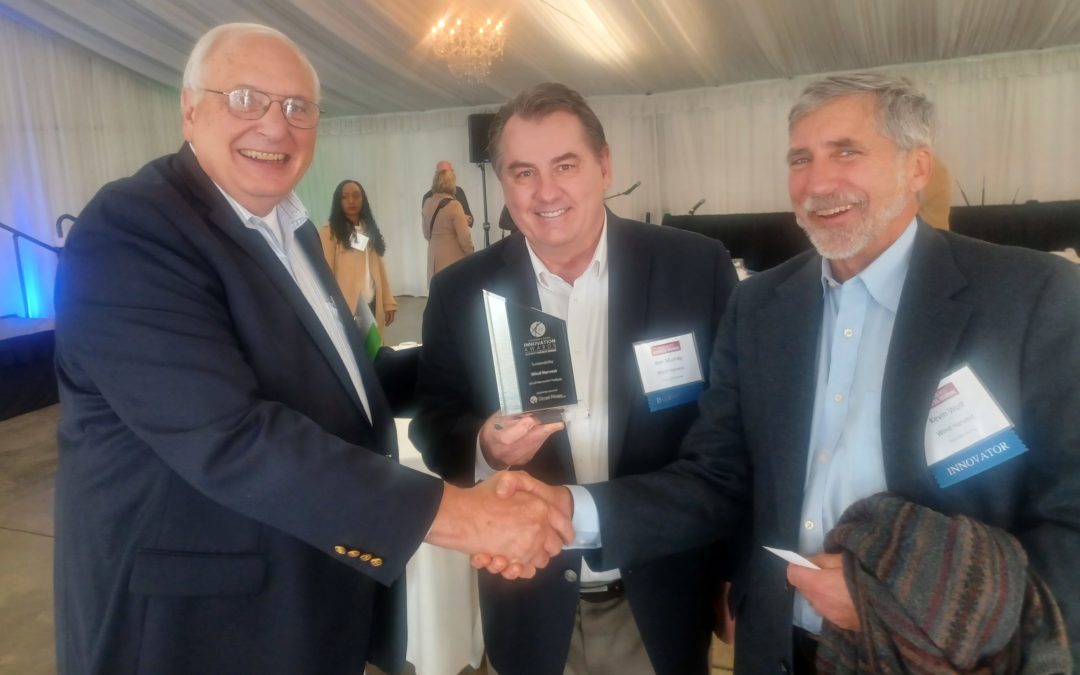On November 18, the Sacramento Business Journal and Stoel Rives handed WindHarvest the Award for Sustainability Innovation of the Year. They were one of 8 Regional Innovation winners announced in various categories at the ceremony, one of the few in-person such meetings held since the pandemic started. It was nice to see so many colleagues again.
We have written about WindHarvest before as they have been advancing their vertical axis wind technology. Their idea is to double the output from existing wind farms with the big towers and big blades using the same real estate and same infrastructure. These vertical axis turbines sit at ground level so are easier to service, can fit between the towers and make use of the wind not captured by the big stuff. Many others have attempted the same thing, only to get marginal results—and in some cases to see their equipment fail.
Kevin Wolf and his team took the approach of extensive computer modeling to come up with a design that would avoid the extreme stresses that doomed the earlier efforts. He also innovated a creative crowdfunding approach to underwrite the building of a first demo plant in Texas, providing his initial $1.5 million. In accepting the award,
Kevin told a brief story of all the bumps in the road they encountered getting this prototype finished. Equipment was delivered late and damaged, Covid interfered with construction progress, and it just seemed it was one darn thing after another. He deserved a Persistence Award as well. He has been getting a lot of customer interest and has started a new $2.5 million funding campaign to begin building the equipment to install on several future projects.
SMUD was the runner-up in this category with its StorageShares program which gives customers the benefit of storage but with an off-site, consolidated installation sited where it is easiest for the grid to handle. The program would have broad applications throughout the utility industry.
While it was the winner in the Food and Agriculture category, the Better Meat Company is worth a mention because it also contributes significantly to sustainability. They produce a fibrous protein product that can be shaped into servings that look pretty close to meat. The product is based on growing fungal mycelia in a fermentation tank that can be cleaned, processed and shaped into meat-like servings, with a texture and taste that is pretty close to actual meat. By cutting out the raising of cattle or chicken, and eliminating the use of so much water and animal feed, Better Meat cuts out a lot of environmental impacts. They have gotten a good reception from some big name food processors and have a 14,000 square foot production facility in West Sacramento.
If you have an innovation that would fit one of the categories for an Innovation Award, please fill out a nomination form and submit your details when the window opens next year. These awards attract a lot of positive attention beyond the region and attract investors. The Sacramento Business Journal issue of November 19-25 has a special section on these awards, so pick up a copy.

ABOUT THE AUTHOR
Gary Simon is the Chair of CleanStart’s Board. A seasoned energy executive and entrepreneur with 45 years of experience in business, government, and non-profits.
CleanStart Sponsors
Weintraub | Tobin, BlueTech Valley, Revrnt,
Moss Adams, PowerSoft.biz, Greenberg Traurig, Momentum,
College of Engineering & Computer Science at Sacramento State


